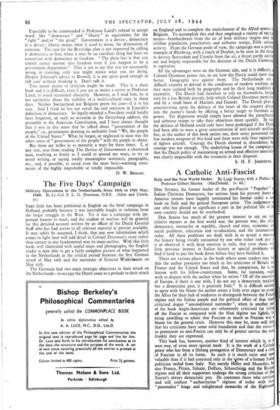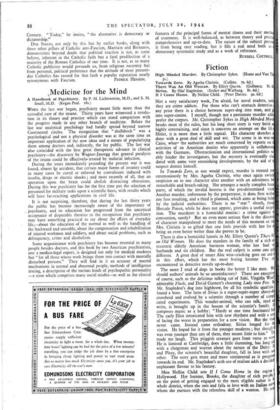A Catholic Anti-Fascist
Italy and the New World Order. By Luigi Sturzo, with a Preface Professor Gilbert Murray. (MacDonald. 75. 6d.) DON &run% the former leader of the pre-Fascist " Popolari " a Italian Christian Democrats, has written from his present home e America (events have happily terminated his formal exile)' a nor book on Italy and the general European crisis. The judgement one who has played so significant a part in the political life of own country should not be overlooked.
Don Sturzo has much of the greatest interest to say on su relative matters as the first world war, the present war, the alh democracy, monarchy or republic, church and state, economic an social problems, education and re-education, and the internatio order. All these problems are dealt with in so actual a mann the history being vividly recounted by one who either took part it or observed it with deep emotion in exile, that even those WI little previous interest in Italian history or special problems find it hard to put the book down before they have finished it.
There are various places in the book where some readers may f that the author presumes too much in his criticisms of Britain an. France and the United States and that, by comparison, he is ax lenient with his fellow-countrymen. Some, for instance, IMO wish to dispute with the author when he writes "_Of all the countrt,:, of Europe, if there is one with, I do not say a democratic traditix but a democratic past, it is precisely Italy." It is difficult entir to agree with the blame the_author seems a little over eager to ac the Allies for their lack of readiness to distinguish between the Fa regime and the Italian people and the political effect of that m criticised slogan " unconditional surrender ", when in another of the book Anglo-Americans are vehemently criticised for lett off the Fascist as compared with the Nazi regime too lightly, being unwilling to admit that Fascism as much as Nazism was blame for the general crisis. However this may be, none will den that his criticisms have some solid foundation and that the views so prominent an anti-Fascist can only -be of greater'service the ma frankly they are expressed.
This book has, however, another kind of interest which is, in own way, of even more special mark It is the work of a Ca priest who has been a lifelong protagonist of Democracy and a cri of Fascism in all its forms. As such it is much .rarer and valuable than if it had consisted only in the dews of a former I politician exiled from Italy. Not merely Hitler and Mussolini, also Franco, Petain, Salazar, Dolfuss, Schuschnigg and the Russ regime and all their supporters undergo the strong criticism of Sturzo's always democratic pen. He contemns those who confu and still confuse " authoritarian" regimes of today with th "paternalist" kings and enlightened monarchs of the Eighteen
Century. " Today," he insists, " the alternative is democracy or features of the principal forms of mental illness. and their met dictatorship." of treatment. It is well-balanced, as between theory and prac Don Sturzo, not only by this but by earlier books, along with comprehensive and up-to-date. The nature of the subject prey those other pillars of Catholic anti-Fascism, Maritain and Bernanos, it from being easy reading, but it fills a real need both as demonstrates beyond doubt that political reaction is not, as some elementary systematic study and as a work of reference.
believe, inherent in the Catholic faith but a fatal predilection of a majority of the Roman Catholics of our time. It is not, as so many Catholic publicists would persuade us, from religious necessity but from personal, political preference that the attitude of most present- day Catholics has earned for that faith a popular reputation nearly High Minded Murder. By Christopher Sykes. (Home and Van



























 Previous page
Previous page